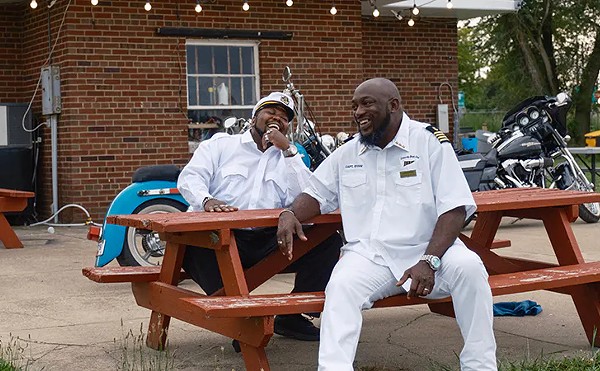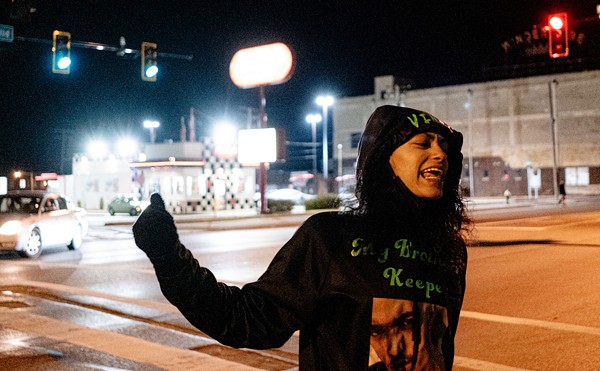Mickey suffers from a congenital disorder that causes muscle atrophy, so he doesn't walk well. Haltingly, he climbed the short flight of stairs to the second floor, where he heard faint music coming from the bathroom. He opened the door. There was a heap of wet towels and clothes on the floor, and the radio had been left on.
Mickey went down the hall to his daughter's room. A human foot jutted out from under a pile of clothes atop her bed. Mickey tore away the pile, only to expose his daughter's blood-covered face. She wasn't breathing. "JoLynn!" he yelled.
She must have tried to kill herself, Mickey thought as he hobbled downstairs in search of the phone. The last month had been chaotic. His wife had moved out. The previous night, JoLynn had argued with her mother.
He called 911 and reported the apparent suicide. The operator directed Mickey to check on his daughter's condition. He couldn't find a heartbeat, but one of her hands felt warm. Her head lay in a halo of blood.
Mickey tossed aside the clothes covering her. Then he saw it.
"Oh!" he yelled to the operator. "Oh, Jeez! There's a knife stuck into her! Oh my God!" A large kitchen knife protruded from her torso. The operator ordered him not to remove it, then talked him through CPR. He kept at it until medics arrived.
JoLynn was already gone.
But this wasn't a suicide. The mess in the bathroom. The blood. The knife. The clothes piled on top of her.
"No," Mickey said aloud to himself. "There's no way she could have done that and then piled the laundry on top of her face! Son of a bitch!"
JoLynn's assailant had bashed her with a bedpost and then stabbed her in the side, leaving the blade buried in her body.
Among the clothes heaped over JoLynn's body was a note: "Dear police. Fuck you. Jill's next. Ask my mom. She knows."
Jill, as it would turn out, was the assailant's girlfriend, and police interpreted the note as a threat that the murderer was embarking on a killing spree.
He didn't get far. Four hours after JoLynne's body was discovered, police found her black Chevy at a restaurant not far from her home. Two boys were in the front seat, four girls in the back. One of the boys was Dustin Lynch, a 15-year-old runaway who had been staying with the Mishnes. The other kids apparently had no idea that they were in the company of a suspected murderer.
JoLynn had brought Lynch home more than a week before her murder. She introduced him as "James Lynette" -- he was traveling under an alias, because he believed his mom had reported him as a runaway. JoLynn told her father that Lynch had been at Denny's, begging for a place to stay.
She was a sucker for charity cases. JoLynn was always donating her old clothes to Goodwill, always playing peacemaker when her friends fought. She begged her father to let Lynch stay the night.
"Well, what's wrong with your home?" Mickey asked Lynch.
The boy unspooled a tale of woe. His parents were fighting and his father was abusive, he said.
JoLynn promised to get Lynch into a shelter the next day. Mickey relented and said the kid could sleep in the study room. But JoLynn wouldn't have it. Lynch would sleep in her room in a sleeping bag.
The one-night stay stretched into a week. Mickey didn't mind too much. Lynch helped him with odd jobs. They talked about the plastics business -- Mickey is in sales. "We were giving him sanctuary," Mickey says. "We were doing a biblical thing of being kind and good to someone that was in trouble." He saw no sign that Lynch was capable of violence.
A week into Lynch's stay, on Halloween eve, Mickey heard giggling upstairs.
"What's going on up there?" Mickey yelled.
"He's letting me dye his hair," JoLynn answered.
When Lynch came downstairs, his hair was fire-engine red.
Three days later, on Saturday, November 2, Mickey got up early. He would spend the day volunteering at the Medina Toy & Train Museum, as he often did on Saturdays. Before he left, he stopped upstairs to say goodbye to JoLynn. She was still in bed, half-asleep.
"Maybe we'll do something later," Mickey told her.
"I love you, Dad," she said.
When Mickey came downstairs, he found Lynch sitting in the living room, entranced by the blank TV screen. "Please let the dog out a couple times," Mickey told him before leaving.
The next time Mickey saw Lynch was in a police station. On the closed-circuit TV, the skinny kid wearing a baseball cap and glasses didn't look like Lynch. But officers told Mickey that the boy had admitted to staying at the Mishne home. They led Mickey into the room where Lynch was.
The boy looked up in surprise. He bent his head in what looked to Mickey like shame and guilt. Then Mickey saw it, peeking out from under the hat: fire-engine red hair.
"JoLynn fingered her own killer," Mickey says, thinking back to the night she dyed Lynch's hair.
The next day, Mickey was in no mood to talk to the media. He gave a prepared statement and referred reporters to Sara Matus, a neighbor and lifelong friend of JoLynn's.
Matus gave reporters the kind of personal details they wanted -- "She liked meeting people," Sara said of JoLynn -- but it was an aside about Lynch, who had visited Matus's house with JoLynn, that would get the most attention.
Lynch was a quiet boy who spent most of his time at her house playing Grand Theft Auto III, Matus said.
GTA III is a violent crime fantasy in which players earn rewards for assaults, carjackings, and murder. It has been incredibly successful by any measure, winning numerous game-of-the-year honors and becoming the best-selling game of 2001.
The over-the-top gore has also made GTA III a prime target for critics, who claim that exposure to violent video games can influence impressionable kids to live out the games in real life. Chief among them is Jack Thompson, who has been on a one-man crusade against sex and violence in the media since the late 1980s.
Thompson grew up in Northeast Ohio and was a news and political junkie by age 11. He went to law school in Nashville, Tennessee, then settled with his wife in Miami, Florida, to pursue a lucrative if mundane career as a medical malpractice attorney.
But Thompson wasn't made for the quiet life, and before long, he would be making headlines. In 1987, he filed indecency complaints against several shock-radio stations in Miami. A year later, he lost a bitter race for state attorney general to Janet Reno.
Thompson achieved national prominence in 1990, when he helped get the 2 Live Crew album As Nasty as They Want to Be ruled obscene -- making it the first album to earn that sanction in American history. An appeals court later overturned the decision.
Next, Thompson went after "Cop Killer," a song by Ice-T's metal side-project, Bodycount. Time Warner distributed the song, so Thompson brought his soapbox to the company's shareholder meeting. In the face of mounting pressure, Time Warner pulled the song soon after.
In 1997, a teenager named Michael Carneal opened fire on a high school prayer circle in Paducah, Kentucky, killing three classmates and wounding five others. When it was revealed that Carneal was obsessed with the movie The Basketball Diaries, distributed by Time Warner, Thompson saw an opportunity to go another round with his old nemesis.
As it turned out, Carneal also played violent video games, including Doom and Quake. Thompson filed a lawsuit against several entertainment companies, but lost when judges ruled it was "simply too far a leap" to go from shooting characters in a video game, which many people do, to shooting people in a classroom, which very few people have done.
Thompson wasn't discouraged. During the Carneal case, he appeared on the Today Show to speak out against violent games. "I said, there's going to be other teenage boys in other high schools who are going to train on this game and kill their classmates," Thompson recalls. "Eight days later, Columbine happened."
Eric Harris and Dylan Klebold, the teen killers, had played Doom. Thompson looked like a soothsayer, and suddenly the media were clamoring to interview him. He has since spoken out against what he calls "murder simulators" on more than 50 national television shows and 170 college campuses. Lately, his prime target has been Grand Theft Auto III.
In October, Thompson filed a $246 million lawsuit against Sony Computer Entertainment America Inc., GTA III designers Take-Two Interactive Software and Rockstar Games, and Wal-Mart, in connection with a Tennessee case in which two teenage stepbrothers killed one person and injured another by shooting rifles at passing motorists. They claimed GTA III as inspiration.
"I think the video game industry is about as evil as any entity in America is," says Thompson. "I'm out to take their money from them -- and it's blood money, in some of these instances -- and give it to the people who have been harmed by them."
Thompson's aunt lives in Northeast Ohio and saw Matus's reference to Grand Theft Auto III in the newspaper. She told Thompson, and within a week he called Mickey.
Mickey was wrestling with why Lynch had committed the crime. In the days leading up to the slaying, Lynch had seemed remarkably well-behaved.
"He was peaches and cream," Mickey says. "He never raised his voice. He never said a four-letter word. I had to twist his arm to get him to eat. He was absolutely docile."
Why would Lynch suddenly snap and brutally murder the girl who had given him shelter? Mickey wondered.
Thompson seemed to provide the answer. Mickey knew virtually nothing about GTA III, but Thompson's description made it sound like a blueprint for JoLynn's murder. One of the game's first missions involves bludgeoning a rival crime boss with a baseball bat and then making a getaway in a stolen car.
The video-game connection also seemed to explain some of Lynch's behavior before the crime. Mickey thought back to the day of the murder, when he found Lynch staring at a blank TV screen. "My own theory is that he was suffering from withdrawal from the game," Mickey says. "At some point, the game took over."
In the days before JoLynn's murder, Lynch accompanied her next door to Sara Matus's house. Matus's live-in boyfriend, Adam Kisilewicz, owned a Playstation 2 and had recently purchased GTA III. Lynch spent hours playing the game.
"He just was really into it," Kisilewicz says. "He took it pretty serious."
Not long after contacting Mickey, Thompson flew to Ohio to take a videotaped statement from Kisilewicz. Kisilewicz told Thompson that Lynch's favorite GTA III murder weapon was the baseball bat.
"He said, 'This is the coolest way to do it,'" Kisilewicz says of Lynch. "And he showed me . . . He stomped the shit out of somebody."
Thompson also pursued his video-game theory when the facts didn't bear it out. During the interview, Thompson "swore up and down that a knife was in the game," Kisilewicz says. In fact, knives aren't available weapons in GTA III.
It's easy to see why Thompson wanted knives to be in the game. JoLynn was not just bludgeoned, but also stabbed. The video game seems more culpable if Lynch's choice of both murder weapons was inspired by GTA III.
Because prosecutors represent victims in criminal trials, Thompson couldn't enter the case as Mickey's lawyer. Instead, he petitioned the judge to become Lynch's defense attorney. (Thompson needed the judge's permission, because he's not licensed to practice in Ohio.) Thompson wanted to argue that Lynch was a victim -- a video-game-hypnotized Manchurian Candidate not responsible for his crime.
But if Thompson were to represent Lynch, it would create a clear conflict of interest, in light of the fact that Thompson was also discussing a civil trial with Mickey, Medina County Prosecutor Dean Holman pointed out.
Thompson responded by saying that Holman was afraid to face an attorney of his caliber. When the judge in the case didn't immediately appoint Thompson as Lynch's attorney, Thompson lashed out at him too, requesting that the judge be removed from the case.
Ultimately, the issue was settled when Lynch chose a different lawyer to represent him. But Thompson isn't a disinterested party. He is planning to represent Mickey in a civil suit similar to the one filed in October, based on the Tennessee shootings.
"We are on a crusade," Mickey says. "We'd like to see everybody who has one of the [games] turn them in, like they do with rifles and pistols. We want to put them out of business."
Prosecutor Holman doesn't seem inclined to make Grand Theft Auto III part of Lynch's trial, which angers Mickey. He says it's as if the prosecutors were ignoring the murder weapon.
Yet to pin the blame for JoLynn's murder on a video game is to ignore something far more important: Lynch himself.
The boy's childhood was hardly idyllic. Violence, especially against women, was a recurring motif. Dustin's mother, Jerrilyn Thomas, says Dustin's father, David, abused her, but she tried to shield her son. "I didn't want him around it, and I didn't want to be around it; that's why I left," she says. She divorced David when Dustin was four years old.
Some of the men she took up with afterward weren't any better. She divorced one husband who belittled Dustin. In 1998, she and Dustin were granted a protection order against a live-in boyfriend who choked and verbally abused her. "He was out of control," she says.
In the summers of 1998 and 1999, Thomas sent Dustin to West Virginia to live with his paternal grandfather, James. "He took Dustin fishing and hunting, all the things that grandfathers should do," Thomas says. Yet James was hardly an ideal role model. He beat his wife to death with a phone in 1975 and served five years for involuntary manslaughter.
Thomas Evans, a psychologist appointed by the court to evaluate Dustin, has said that the boy learned a lesson from these men: "When things don't go right, you hit people."
Dustin began running away from home at age 11. He dabbled in such petty crimes as shoplifting before moving on to drug possession and auto theft. In all, he was locked up by the juvenile justice system on seven occasions.
He gave plenty of warning signs that there was more trouble to come.
In February 2002, Thomas was given a journal that Dustin had kept during his stay in Medina County's detention center. Lynch had written out fantasies of killing his father and others. "He just talked about the things that he wanted to do to his dad, because he was upset with him about things that he did to me," Thomas says. "He talked about a few other people."
When Dustin returned home from that stint in detention, he had cuts on his arms, Thomas says. "He tried to commit suicide, and nobody told me about it."
Dustin was soon back in detention, serving six months for stealing a car. He was released on October 20, 2002. Soon after, he talked his way into JoLynn's house. A little more than a week later, she was dead.
Perhaps the person with the most to gain by blaming a video game for JoLynn's death is Dustin Lynch. He is scheduled to be tried as an adult on January 12, and if he is convicted of the most serious charge, he faces life in prison without the possibility of parole for 30 years -- at which time he will be 46.
But Lynch says Grand Theft Auto III had nothing to do with JoLynn's death. In fact, he seems offended that someone would suggest that it did.
"Old man Mishne and whomever else believes that GTA III influenced me to brutaly [sic] kill JoLynn . . . they are all idiots!" Lynch wrote in a letter to Scene. "I killed JoLynn Mishne for my own personal satisfaction, not because of a video game."
The most compelling evidence supporting the video-game theory is that Lynch bashed JoLynn with a bedpost, similar to the baseball bat that was his favorite weapon in GTA III. Yet Lynch says he was only grabbing what was close at hand.
"I used the bedpost to beat her face with because it was right there on the bed," he writes. "[The bedposts] were both held on to the end of the bed with screws, but the holes they fitted into were stripped and both post[s] lifted off rather easily."
Lynch claims to have begun thinking about murder at an early age: "Ever since I was 6 yrs. old, I've wanted to kill someone." By the time he was a teenager, he was obsessed with "sex and dead bodies," he writes.
"I started masturbating to pictures of women with slit throats and stuff like that and that was what satisfied my needs," he continues. "That's what it feels like, like a need, a craving, I just couldn't resist!"
Lynch claims that he began acting on these desires when he was living with his grandfather in West Virginia. He says he stole his grandfather's gun and practiced shooting in the woods in back of the house.
At this point in his narrative, Lynch veers into some sort of twisted adolescent fantasy: He claims to have murdered 35 other people.
"Guess what . . . they'll never find the bodies either!!!!!" Lynch brags, punctuating like a schoolgirl writing about her first crush. "I bet I'm the youngest serial killer ever!!! Sweet!!!" (Authorities in West Virginia are investigating.)
Some of Lynch's rantings seem cribbed from videotapes made by the Columbine killers before their rampage: "I have no remorse for anything I've done to any of the 35 innocents!" he writes. "Fuck them, fuck you, fuck the world! The only people I care about is Adolf Hitler and myself! Heil the fuhrer! Hitler is God!"
But in the last paragraph of the letter, Lynch sounds less like a monster than a kid who is deeply concerned with how he is perceived: "The only thing I ask of you is that you send me a copy of the story, I really look forward to seeing it! I hope I didn't disappoint you in anyway [sic] about the GTA III angle. Sorry!"
Lynch reportedly cried at some of his court appearances, but in a second letter to Scene, Lynch tried to sound macho. "Tell me what hearings I cried at, because I don't remember," he writes. "Everything that's happened was very [much] what I exspected [sic] and there is no reason to cry!"
He also admits that the journal he kept was his way of seeking assistance before he acted on his violent fantasies.
"Yes, that was a cry for help," he writes. "I purposedly gave it to the teacher . . . because I knew he'd turn it over to the magistrate and then I would be forced not to kill those specific people because I'd get caught."
As for his future, Lynch says he wants to get a high school diploma and write a book. He says he has no fear of going to prison.
"I might be small but I know how to handle my business," he writes. "I'm a 'Lynch,' it runs through [our] blood. Just like jail!"
Mickey received a similar letter from Lynch, but the father still believes Grand Theft Auto III inspired his daughter's killing.
"There's a status among prisoners," Mickey says. "And a little, bespectacled shrimp who killed because he was influenced by a video game is nobody. But a cruel, pathological killer who killed for pleasure is somebody."
But video games weren't the only outlet for Lynch's violent fantasies. He was also a fan of James Patterson's "Alex Cross" novels, which include Along Came a Spider, Kiss the Girls, and Jack and Jill, and he freely admits to looking to the books for inspiration. "Yes I do think those books gave me some influence in other murders but not JoLynns [sic]," Lynch writes. "They gave me some extra ideas."
Why would Lynch deny that video games were an influence, but admit that books were? Perhaps because Lynch wasn't inspired by GTA III and committed murder for reasons all his own.
This much is obvious to Kisilewicz, whose statements to Thompson about Lynch's obsession with using a baseball bat in GTA III would be the crux of a civil suit against the game's makers.
"This is one seriously demented individual," Kisilewicz says of Lynch. "There's really no getting around it."












